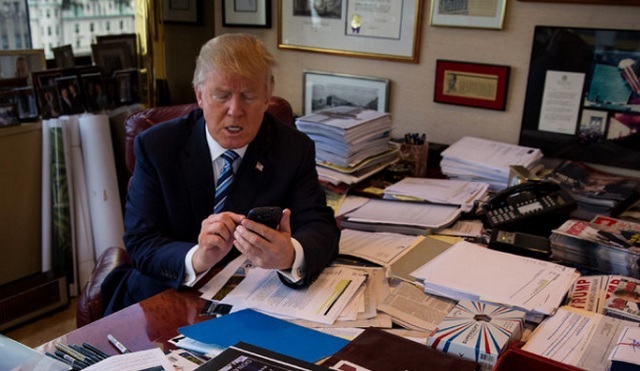
Washington, United States | AFP |
US presidents are normally wary that their words alone can move armies and markets, but for President-elect Donald Trump, incendiary early morning tweet-bombs are a style of governance.
Since his shock win on November 8, the septuagenarian mogul has used Twitter to wade neck-deep into fast-flowing political and constitutional waters — often before most Americans have finished their breakfast.
He has questioned free speech, targeted individual journalists and made spurious allegations about voter fraud in an election he won.
The effect has been to re-energize his base, rile his political foes and perhaps deflect from troublesome reporting about his cabinet appointments and his business interests conflicting with the world’s most powerful office.
The unorthodox utterances have also raised more questions than answers: Is he posturing? Is this US government policy? Does it foreshadow legislation? Is it running commentary? Is he serious? What will he tweet next?
President Barack Obama has cautioned that Washington’s web of power centers will prove a reality check for Trump, yet it is difficult to disregard messages sent to 16 million followers that echo across the world.
Each new tweet has moneymen and diplomats across Washington dashing out cables to their capitals and bosses guessing at the importance of what has been said.
Will he really end the detente with Cuba? Will he ban Somali migrants? Will he jail Americans and strip them of their citizenship for burning the flag? Will he gut Obama’s health care reforms?
The lives of millions, and the profits of tens of thousands of businesses, depend on the answer.
The White House, for one, is not willing to venture a guess, at least in public.
“I will let the president-elect and his team discuss the words that populate his Twitter feed,” said White House spokesman Josh Earnest.
Past as prologue?
Throughout Trump’s career as a real estate tycoon, socialite, celebrity TV star and politico, Trump has weaponized the media — first the New York tabloids and now Twitter.
He once masqueraded as spokesman “John Miller” or “John Barron” — Barron is the name of his youngest son — to tell People magazine and others about his winning exploits.
The result was beneficial coverage that helped mold his brand as a successful playboy billionaire.
It could be that Trump is similarly cultivating his image as a political maverick who will “drain the swamp” of Washington.
Although he is the first man elected to the presidency of the United States without any political, diplomatic or military experience, Trump has very notably stocked his presidential cabinet with old Washington and Wall Street hands.
David Axelrod, a former adviser to Obama, sees the tweets as bait.
“This is just a flare–red meat for base,” Axelrod said on Twitter, adding the “real story” is his appointments.
Trump’s tweets have annoyed some in his own party, including Senator Lindsey Graham, who objected to Trump’s claim that millions of people voted illegally in the election.
“You are now the president-elect of the United States,” Graham said. “If you really believe that millions of people voted illegally, you should have some proof. Because your voice is not just an ordinary voice.”
“If there is not evidence, please stop saying that,” Graham said.
The 2008 Republican presidential nominee John McCain has — rather optimistically — asked journalists to stop asking him questions about Trump’s statements.
In a rare post-election interview, Trump himself said that his social media habits would change when he takes office.
“I’m going to be very restrained, if I use it at all, I’m going to be very restrained,” he told CBS’s “60 Minutes.”
Many doubt whether Trump will ditch a useful tool of presidential power, a modern incarnation of Theodore Roosevelt’s idea that the presidency can be a megaphone and a “bully pulpit.”
But that pulpit, while powerful, depends on people taking you seriously.
 The Independent Uganda: You get the Truth we Pay the Price
The Independent Uganda: You get the Truth we Pay the Price





